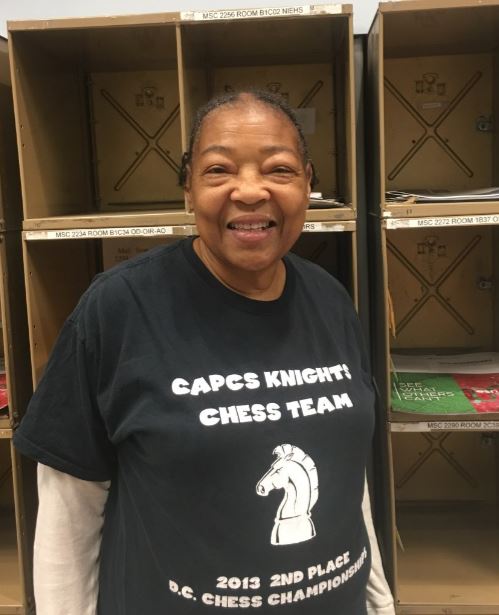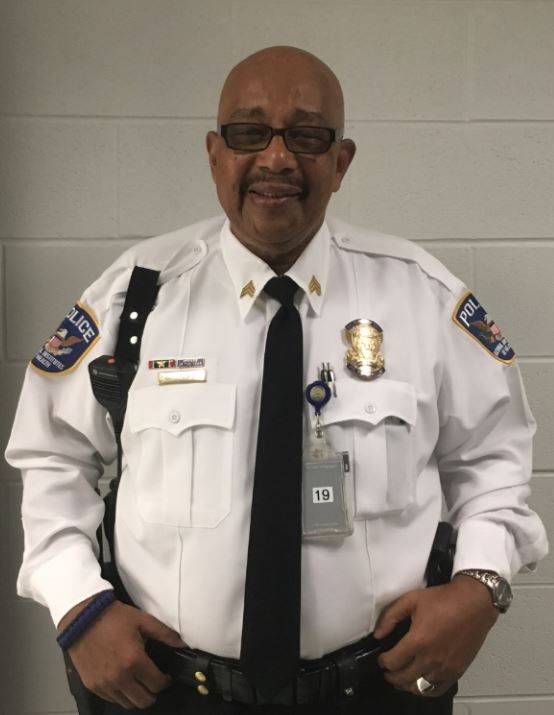The Office of Research Services (ORS) is comprised of a diverse portfolio of services that support the NIH mission. In this section - I AM ORS, we showcase the exceptional employees behind these vital programs.
Addie Brinkley, Lead Mail Clerk

In 1974, when Addie Brinkley began working in the NIH mailroom, she had the equivalent of a third-grade education and was making $1.65. She applied for a job in the mailroom after dropping out of school due to a learning disability. Addie dropped out of school in the ninth grade. "Coming from Georgia [to Washington, D.C.] in the third grade," she says, "I couldn't comprehend and didn't know [how] to read — I was just a lost child." Yet, Addie did not give up. "For someone coming from not knowing how to read and write until now, I'm a lead mail clerk here, so basically [it's] an accomplishment," she said proudly.
As a lead mail clerk for the Division of Mail Management Services (DMMS), Addie processes and sorts incoming, outgoing and interdepartmental mail. Through spelling and pronouncing the names of people and institutes, she says she learned how to read and write. Addie said colleagues that spoke well were also helpful in her learning. "I love when people correct me, and I smile when they correct me because a lot of times you don't know until somebody [corrects you]," she says.
Addie is currently a student at the Academy of Hope, an adult public charter school in Washington, D.C. She looks forward to graduating next year in 2020. Prior to Academy of Hope, Addie studied with the Washington Literacy Center of which she completed coursework in 2011.
In her spare time, Addie cares for a disabled Veteran and elderly woman, and likes to pay a visit to her grandchildren's school. She lives in Washington, D.C. along with five children.
Alex Salah, Chief of Access Control Branch

Alex was just a teenager when he took a liking to the NIH. He was first introduced to the NIH in high school when an older brother landed a summer internship with the National Institute of Dental and Craniofacial Research (NIDCR). During this time, Alex would visit the Clinical Center after school on Fridays. "In those days, up on the 14th floor on Friday nights, you could play volleyball and ping pong, and I loved to play ping pong," he said. "I've always liked the NIH."
Thirty-nine years later, Alex is Chief of the Access Control Branch for the Division of Personnel Security and Access Control (DPSAC). He became a fed and began working at the NIH in October 1980 as a cashier in the Financial Management Division. In his current role, Alex and his team handles all access issuance and software, grants and revokes access and runs weekly reports for security requirements.
Aside from his leadership role, Alex is a master electrician and owns an electrical business. He plans to focus solely on his business when he retires from the NIH. Alex says as an electrician he receives instant gratification solving problems and making things work again. "I think of myself as one of the best troubleshooters," he said. "I can fix anything. That's my attitude — I can and I have." Alex learned the trade in the NIH apprenticeship program. The former program taught employees with low-paying salaries a trade.
Alex was born in Amman, Jordan and grew up in Wheaton, Maryland. He has a big family and enjoys long weekends at the beach.
Michael Lake, Police Officer

Sergeant Lake is proud to be a police officer with the Division of Police (DP). He also is proud to have made an impact on the NIH community. Lake helped redefine NIH terminology by introducing the term "code blue." Lake said he used the term or call "code blue" while responding to an emergency in the Clinical Center. "Code blue" is a universal term used to refer to cardiopulmonary arrest and other type of emergencies. Officer Lake said he reacted and called a "code blue," however the dispatcher was unaware of its meaning. At the time, the term "heart and lung OD" was used at the NIH to alert cardiovascular emergencies. However due to the miscommunication, the appropriate rescue team did not arrive in timely manner. Following the incident, Officer Lake noted in his report the call he gave for help, and later "code blue" was adopted into the NIH terminology. This incident was 39 years ago when Officer Lake first started at the NIH as a master patrol officer.
Officer Lake was recently promoted to Sergeant in August 2019. As Sergeant, Lake supervises other officers, ensures they adhere to directives, conducts performance evaluations, and continues to protect the NIH community and government property. Prior to joining DP, Lake worked as a federal guard with the Department of Interior. Officer Lake had a chance to understand police work, while serving as a Military Police Officer stationed overseas. From the time he arrived at the NIH, Lake says DP invested in him by allowing him the opportunity to attend the Police Academy and other trainings. When he returned from police training, Lake "stayed in the ranks and kept improving," which has ultimately led to his promotion to Sergeant.
Sergeant Lake is from Brooklyn, New York, but born and raised in Trinidad. In his spare time, he enjoys watching sports.
